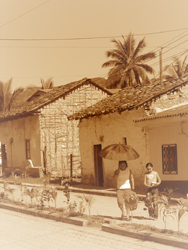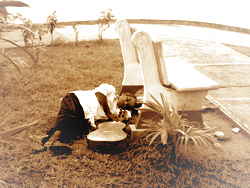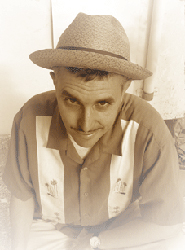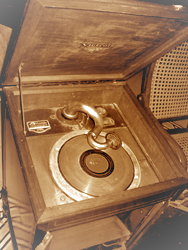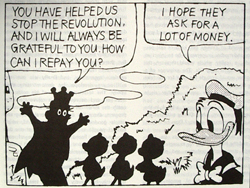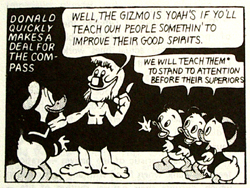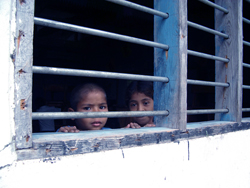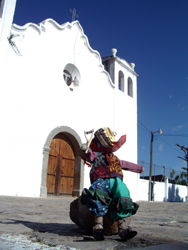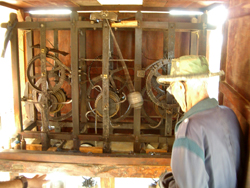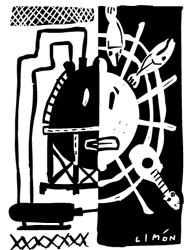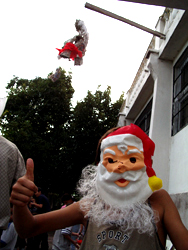Vintage Honduras
Dispatch from California & Comayagua - December 2004
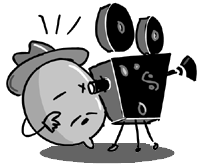
| Zacapa, a day in the life of... Nestled among the ample cleavage of the Santa Barbara mountains—dotted with coconut palms and banana trees—sits the dozing town of Zacapa. Even by the standards of this land of extremes, these are severe peaks that even the monkeys refuse to climb. Folds of vertical pleats and trees cling into the cracks, growing first down and then barely winning the fight against gravity to point skywards. The town lays panting, waiting for the onset of darkness when the heat, at least for the duration of night is enveloped in a cool cape of darkness. Here was another day. Everywhere people are overwhelmed with a lassitude and languidness very like a hangover while welt-covered dogs sprawled in the shade of the cracked concrete sidewalk lick at their fur caked in a mud and fleas. |
|
|
|
The sun crawls listlessly over the mountains as ever in an unmerciful state of mind to direct its inferno from overhead. There is no breeze whatsoever and the flock of parakeets are falling stone dead from their perches in the Ceiba trees. A confusing haze of dancing veils hover over the scorched concrete, blistering and twisting the corrugated iron roofs with a loud cracking noise. Nocturnal bats swarm from their roosts in the hollow trees and swoop along the surface on the ponds, risking suicide in the quest for water. The limes ripen in minutes in the citrus grove on the edge of town. A waifish chicken is being stoned from a safe distance by a band of bored teenagers. |
|
People move in the shadows and shade, fighting the lethargy and roasting. Esmerelda in her ever more scandalous tops continues to bring in more gawking customers. Claudia, pregnant again spends her day wistfully undressing the mechanics working on the trucks outside her window. In the post office, Rubberman sits with his eyes closed humming opera to himself and wishing he had someone to write to while a trysting couple suck each others faces in the darkness of the office. Professor Mendez peddles around town on his miniature bicycle with his bundle of papers and manuscripts clutched to his knees. The corpulent Don Tinoco, his exposed rotund belly glistening with sweat, chuckles to himself at his ever expanding collection of rabbits nibbling their way through his fields. He prides himself on his diet of beans and spends all night suffocating his wife with his noxious farts. Chepe mumbles from person to person indecipherably as his children begin asking difficult questions about paternity and masturbation. |
|
|
At
the Hotel Safari the Cuban doctor puts a wilting bloom into a jam jar
and paints its stem with nail varnish. The mayor, long since detached
from public service adds specimens on a seemingly daily basis to his
ever-growing private zoo. By the river, two stocky and ferocious dogs
are straining at their chains hoping to snag an unsuspecting guinea
fowl or toad and later dreaming of wandering the world, sniffing exotic
smells dragging their doghouse behind them. Nixon walks proud in his
new shoes eyeing up the next disinterested victim of his amorous attentions.
Tele, brushing ants from his face sits guarding the town’s only
functioning telephone still wondering why and how his wife left him. |
Then
came the rain. Outside in the intermittent but perpetual downpour the
cadaverous perfume of the air was washed down onto the streets where
it filled the sewers and turned the streets into a thick muddy soup.
Thunder cracked like a whip of a giant wet eel. A naked child was being
washed in the steaming drizzle by someone who could be his sister but
was probably his mother. As the rain ran dry, the puddles evaporated
and through the curtain of steam, life continued unabated. Zacapa—in
so many ways the definitive Honduras town—neat and comely and
yet so tragically average. |
|
|
|
Hondorica In the Walt Disney comics of which I was so obsessed in my youth I was much enamored by the adventures of Donald Duck drawn by my onetime childhood art hero Carl Barks. These featured intricately drawn adventures which followed the Disney duck as he traveled around the world to places like “Instabilidad” in Asia-stereotype-land and to the Unca Unca tribe in a land somewhat unlike Africa (often financed by his Capitalist uncle McScrooge). One of the countries he visited was the exotic land of Hondorica (east of San Banador, north of Inca Blinca). It was a comic paradise where shambling peasants welcomed Donald and his three cute nephews and gladly hand over all the treasures they have never learned to appreciate. The Hondoricans, naturally, speak English and live in picturesque huts and ruins. Donald would ultimately save them from the “mistake” of revolution and accept bananas, gold bullion and treasures in return whilst handing out bars of soap to the un-scrubbed yet affable, happy, trusting very easy to placate and deceive natives. |
|
It is only now that I realize the vision of Disney is not dissimilar to that of US foreign policy to this day (how could I have been so naive?). The tragedy of course is that these comics left a huge impression on me (enough anyway for the political aspect of them to form my art school dissertation back in 1987) and ironically were enjoyed in Spanish translation all over Latin America. The eighties was a traumatic time in Honduras where the US basically moved in with the support of the Honduran military and ran the country as an army base to suppress the popular uprisings in El Salvador, Guatemala and Nicaragua who’s “contra” fighters displaced and killed thousands of Hondurans. Hundreds of “subversives, agitators and political opponents” disappeared or were murdered by the “Mancha Brava”. |
|
|
|
After
the US began to leave it was clear that Honduras had been duped. The
US had promised aid but never delivered (Reagan had so much trouble
getting money from congress for his little campaigns that he ended up
trading arms for hostages in Iran as we all know) and the little that
did arrive disappeared into the overseas bank accounts of the Honduran
generals who quickly relocated to Miami. Human rights, democracy, sovereignty,
the economy and social harmony were set back to among the lowest levels
in Latin America. |
|
It is my homble opinion
of course that the real problems of Honduras are malnutrition, parasites,
unemployment, lack of housing, schools, health clinics, electricity,
clean water and roads. The conundrum is that despite being overrun with
well-meaning Non-Governmental Organizations and International Charities,
all whom are here at the bequest of the Honduran government none can
take the necessary steps to organize to effect change on a national
level. |
Colonial Capers I’ve been doing extremely unsustainable development. I’m drawing tourist maps and eco-tourism literature. I’ve made a useful contact with the Honduran Tourism Institute. As volunteers we’re not actually allowed to receive any money but they are happy to ship me around the country all-expenses paid to draw maps. So far we have been to Comayagua which is the old colonial capital. We stayed in a big hotel with a swimming pool where we were the only guests and the barman kept phoning our room to ask if we needed drinks. In international volunteerism it’s a delicate balance between altruism and personal gratification. Comayagua was founded by those ever industrious Spaniards in 1557 who were very fond of the place until the nearby silver mines ran dry. Comayagua used to be the capital of Honduras. The Spanish built lots of what was then “new” building but what are now referred to as “colonial” structures. After the capital was moved to Tegucigalpa in 1890 Comayagua was pretty much forgotten about. |
|
|
These
days Comayagua is hoping to become
Honduras’s very own Granada (in Nicaragua) or Antigua (in Guatemala).
Backpacker
friendly Colonial
gems on the Central American on a shoestring
trail. The
finest attraction (for there are many) is the oldest clock in the Americas,
shipped out from Granada by King Felipe II of Spain back in 1100. It’s
held together with tape and wire but still works pretty well, ringing
the huge bells every fifteen minutes. A fine outstanding—and some
would say legendary citizen called Blas Reyes—is empowered with
the upkeep of the Reloj Arabe and ably demonstrated the fine
craft of clock winding for us.
Comayagua has a ways to go but one day it will be Honduras' finest city. |
| Intercultural Epiphanies We were back in San Francisco, USA last month and have just about recovered from our brief sojourn away from the tropics. We both got colds immediately as we stepped from the aircraft. You could actually see the viruses burst through customs to greet us at the gate. It was a strange feeling wearing heavy clothes again and sleeping under bulky bed covers. Everything seemed exactly the same except tiny little details—a new signpost here, a different color there. Things missed include the wide selection of international cuisine, dressing up and cheese. Things not missed: huge portions, parking restrictions and Republicans. Also I could feel the stress level slowly increasing day by day. It was quite nice to get back to all our work in Zacapa where you can worry over real issues such as where to get money to start a food program rather than where to park your car or what type of biscotti to order with your decaf latté. |
|
|
The World's Gone Mad and We're All Invited To
say Election Day was very sad would be an understatement. We were invited
to the ambassador’s party at the Intercontinental Hotel. It was
huge bash with foreign dignitaries, politicians, celebrities and the
president as well as scruffy cynical International volunteer workers
like ourselves. There was also exquisitely prepared free food and open
bar! American tax dollars at work. Still didn’t make up for the
utter disappointment when it emerged that we’re in for another
four years of dangerous regressive compassionless conservatism. I’ve
been through the stages…. Sadness, anger, denial, hostility, intent
to kill, etc. What a sad day for humanity.
|
Por Primera Vez A mobile film festival rolled into town (at my bequest). We went into some of the most remote and impoverished communities in Honduras. Many didn’t even have roads. The rain held back. Most people had never even seen TV before let alone a movie on a big screen. The entire town came out and the reaction was amazing although one strange moment was when we showed a documentary about the Lencan people. These communities are Lenca too but because they are so poor and isolated they have sadly lost many of the “unnecessary” traditions like dressing in the colorful clothes and dancing around in masks. When they saw the Lencan depicted in the documentary they thought it was a comedy. They also shouted out a lot at the screen. When one scene showed a poor man carrying a heavy bunch of firewood on his back (probably thought by the filmmaker to depict humble simple ways) someone shouted that he needed a mule (to riotous laughter). I couldn’t help think that they enjoyed pleasure in seeing people even more destitute than themselves in some ways. This was similar to when we showed “The Pianist” to some Hondurans and they laughed all the way through, especially when the old man got pushed out of the window in his wheelchair. It turned out they’d never heard of World War II. Alas. Our work here in so many ways has only just begun. |
|
Feliz Año Nuevo

Previous dispatch | Next dispatch
©
J. Lemon / Lemonworld 2005. All rights reserved. This
web site is not an official publication of the Peace Corps or the U.S.
Government. The contents of this Web site reflect the personal opinions
and observations of the individual(s) contributor(s) and do not reflect
any position of the U.S. Government or the Peace Corps. |
